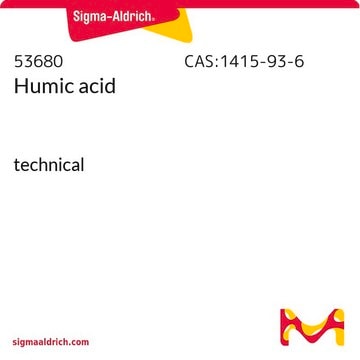403040
Tannic acid
ACS reagent
Synonyme(s) :
Gallotannin, Tannin
About This Item
Produits recommandés
Qualité
ACS reagent
Niveau de qualité
Température d'inflammation spontanée
980 °F
Résidus de calcination
≤0.5%
Perte
≤12.0% loss on drying, 105°C
Pf
218 °C (lit.)
Traces de cations
Zn: ≤0.005%
heavy metals: ≤0.003%
Chaîne SMILES
Oc1cc(cc(O)c1O)C(=O)Oc2cc(cc(O)c2O)C(=O)OC[C@H]3O[C@@H](OC(=O)c4cc(O)c(O)c(OC(=O)c5cc(O)c(O)c(O)c5)c4)[C@H](OC(=O)c6cc(O)c(O)c(OC(=O)c7cc(O)c(O)c(O)c7)c6)[C@@H](OC(=O)c8cc(O)c(O)c(OC(=O)c9cc(O)c(O)c(O)c9)c8)[C@@H]3OC(=O)c%10cc(O)c(O)c(OC(=O)c%11cc(O)c(O)c(O)c%11)c%10
InChI
1S/C76H52O46/c77-32-1-22(2-33(78)53(32)92)67(103)113-47-16-27(11-42(87)58(47)97)66(102)112-21-52-63(119-72(108)28-12-43(88)59(98)48(17-28)114-68(104)23-3-34(79)54(93)35(80)4-23)64(120-73(109)29-13-44(89)60(99)49(18-29)115-69(105)24-5-36(81)55(94)37(82)6-24)65(121-74(110)30-14-45(90)61(100)50(19-30)116-70(106)25-7-38(83)56(95)39(84)8-25)76(118-52)122-75(111)31-15-46(91)62(101)51(20-31)117-71(107)26-9-40(85)57(96)41(86)10-26/h1-20,52,63-65,76-101H,21H2/t52-,63-,64+,65-,76+/m1/s1
Clé InChI
LRBQNJMCXXYXIU-PPKXGCFTSA-N
Vous recherchez des produits similaires ? Visite Guide de comparaison des produits
Description générale
Application
- Synthesis of ferric tannate complexes by reacting with metallic iron.
- As a protein deproteinizing agent in genomic and plasmid DNAs preparation.
- As a reductant in the synthesis of metal nano particles.
Code de la classe de stockage
11 - Combustible Solids
Classe de danger pour l'eau (WGK)
WGK 2
Point d'éclair (°F)
390.2 °F
Point d'éclair (°C)
199 °C
Équipement de protection individuelle
Eyeshields, Gloves, type N95 (US)
Choose from one of the most recent versions:
Certificats d'analyse (COA)
Don't see the Right Version?
If you require a particular version, you can look up a specific certificate by the Lot or Batch number.
Déjà en possession de ce produit ?
Retrouvez la documentation relative aux produits que vous avez récemment achetés dans la Bibliothèque de documents.
Notre équipe de scientifiques dispose d'une expérience dans tous les secteurs de la recherche, notamment en sciences de la vie, science des matériaux, synthèse chimique, chromatographie, analyse et dans de nombreux autres domaines..
Contacter notre Service technique






